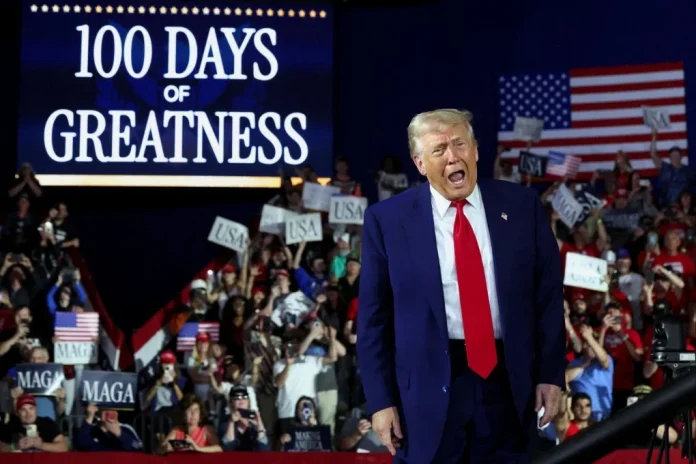In a significant legal setback for former President Donald Trump, a federal judge recently blocked an executive order aimed at using wartime powers to expedite the deportation of undocumented immigrants. This ruling comes at a critical moment in the ongoing national debate over immigration policy, reflecting both the power of the judicial system to limit executive authority and the contentious nature of Trump’s immigration agenda. The case has far-reaching implications, not only for Trump’s past immigration policies but also for the future direction of U.S. immigration law.
The executive order in question, signed by Trump, sought to invoke the national emergency powers typically reserved for wartime situations in order to fast-track the deportation process for undocumented immigrants residing in the United States. By categorizing the issue of illegal immigration as a national security threat, the Trump administration had hoped to bypass standard legal procedures and expedite the removal of individuals in the country illegally. The rationale was that this would enhance national security and enforce the law more aggressively, two pillars of Trump’s hardline immigration stance.
However, the judge’s decision to block this executive order marked a significant blow to the Trump administration’s ongoing efforts to tighten immigration controls. The ruling came after significant legal challenges from advocacy groups, which argued that the use of wartime powers was not justifiable in the context of immigration enforcement. The judge’s ruling stated that the Trump administration had failed to provide sufficient evidence that national emergency powers were necessary to deal with what is largely considered a domestic issue rather than a wartime crisis.
For years, Trump’s immigration policies have been among the most controversial aspects of his presidency. His administration’s efforts to build a border wall between the U.S. and Mexico, separate families at the border, and implement the “zero tolerance” policy for illegal crossings were met with both fervent support from his base and widespread criticism from immigration advocates. The use of wartime powers to expedite deportations was seen by many as an attempt to further centralize control over immigration enforcement, sidestepping traditional judicial and legislative processes.
The judge’s ruling reflects the legal pushback that has consistently faced many of Trump’s more aggressive immigration measures. Courts have often been a check on the executive branch’s authority, especially when policies infringe on individual rights or lack sufficient legal justification. In this case, the judge found that invoking wartime powers for immigration enforcement was a step too far, arguing that such powers should not be used for matters unrelated to actual war or national defense.
The legal battle over this executive order underscores the larger tensions within U.S. immigration policy. While Trump’s supporters argue that strict enforcement is necessary to maintain order and protect American jobs, critics contend that such measures are often draconian and inhumane. The question of how to balance border security with human rights and the rule of law has been at the center of political debate for years, and Trump’s approach to immigration only served to intensify these divisions.
This decision by the court is not just a legal victory for immigrant rights groups, but it also serves as a reminder of the limitations on executive power in the United States. While the president holds significant authority in matters of national security and foreign policy, the judiciary has consistently acted as a counterbalance, ensuring that the actions of the executive branch are held accountable under the Constitution.
The ruling also signals the ongoing challenges Trump and his political allies will face in their attempts to reshape immigration policy. As Trump continues to exert influence within the Republican Party, the immigration issue is likely to remain a focal point of his political agenda. However, the legal hurdles that have consistently blocked or delayed his more extreme policies, like the wartime powers order, show that the path to further restricting immigration is far from clear-cut.
Moving forward, this ruling could have lasting implications for future administrations as well. It highlights the need for careful legal consideration when enacting sweeping changes to immigration policy and serves as a reminder that the courts will continue to be a significant arbiter in the ongoing debate over immigration reform.
As the U.S. prepares for the upcoming 2025 elections, the fallout from this legal decision will likely play into the broader national conversation about immigration. While Trump remains a polarizing figure, his hardline stance on immigration continues to be one of his most influential political positions. The legal challenges to his policies are not over, but this latest defeat serves as a powerful reminder that the judicial branch will continue to play a pivotal role in shaping the future of U.S. immigration law.




